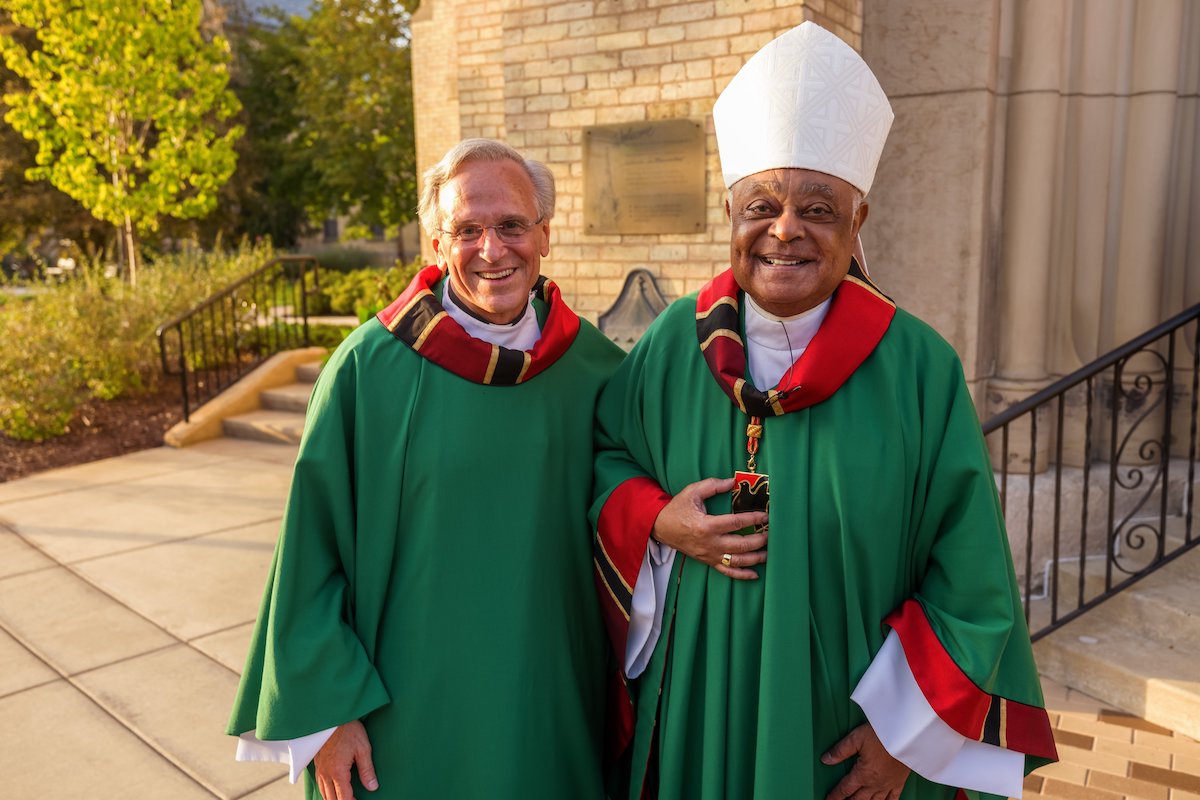By Patricia Zapor, Catholic News Service
In a jubilant Mass Oct. 9 concluding the Black Catholic Theological Symposium, Cardinal Wilton D. Gregory of Washington called the congregation to remember the Gospel’s lesson to “live the fullness of life even now,” despite struggles including societal disparities that disadvantage some people.
The liturgy at the Basilica of the Sacred Heart at the University of Notre Dame in Indiana included many students in addition to the participants in the three-day symposium.
Joyful music, much of it Gospel-style, punctuated the Mass.
Cardinal Gregory put the Scripture readings in the context of lessons the world has learned from the COVID-19 pandemic, saying it “has unmasked a few realities that many of us may have long suspected” such as huge disparities in opportunity that separate groups of people in the United States.
“Race, age, culture and ethnic backgrounds often divide us and determine or impede our quality of life,” he said.
“We know that there are vast and morally unacceptable differences that distinguish the life expectancies of peoples not only in countries other than our own,” he said, “but even within our own nation, men and women have different life expectancies and peoples of different cultures and regions differ considerably in their general health, educational opportunities and even length of life.”
Cardinal Gregory connected that thought to the guidance Jesus gave the disciple in the Gospel who asked what he needed to do to be a part of the kingdom of God.
Jesus’ answer — to sell everything and follow God’s way — offers wisdom that applies in the face of contemporary questions about how to achieve the best quality of life, he said.
“The wisdom of science, as vast and wonderful as that wisdom may be, as hopeful as that wisdom may present itself, is not sufficient to answer all the quality of life issues in our own time,” he said.
“Just as the simple but careful observance of the commandments of the law was insufficient for the wealthy man in today’s Gospel, there is, after all,” he explained, “a wisdom that we all ought to seek, that offers an entry into life that is richer than the lives we presently enjoy.”
He said that those who seek Jesus, like the rich man in the Gospel, “are looking to improve more than simply the quality of our lives. … More than a fine figure and good health, more than length of years and human vigor, what we are asking of Jesus cannot be achieved with mere observance of commandments or even rigorous health regimens.”
Jesus’ answer to the rich man “is also spoken to us. A willingness to trust more completely in God’s goodness, that is ultimately what Jesus asked of the rich man,” said the cardinal.
“Cease relying on your wealth, your good looks, your authority, your native intelligence, your powers of persuasion and come to trust in God’s providence more,” he said. “Admit that there are advantages that some people enjoy because of their race, their culture or background that are denied to others for those very same reasons.”
Like for the rich man, he continued, “there is a moment in every person’s life when we must admit that riches, our natural gifts and talents and even our privileges that come with our race are insufficient to achieve that life to which we are called and for which we long.”
One path, said Cardinal Gregory, lies in eucharistic worship, which “allows us to join the rich man in admitting to ourselves and before all other believers that we are destined for everlasting life.”
It is at the eucharistic table, he said, where believers “are invited to transform the world in which we live by that same vision and that same mystery.”
“It is more than simply a quality of life issue,” the cardinal said. “It is the call to begin to live the fullness of life even now, and to pursue justice for all who are our brothers and sisters, across those barriers of privilege or discrimination that so often divide us.
“May our desire to work for justice be the spark that we take from this Eucharist.”
The symposium included two days of private meetings and an invitation-only listening session for Black Catholic students, community members, faculty and staff.
Retired Bishop Edward K. Braxton of Belleville, Illinois, lectured Oct. 8 on the Catholic Church and the racial divide in the United States.
M. Shawn Copeland, professor emerita of theology at Boston College, gave an Oct. 7 address that touched on how the Black Lives Matter movement not only qualifies as an example of public theology but it also exemplifies Christian teaching.






